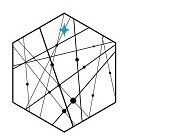

Report: “Outer Space Cyberattacks: Generating Novel Scenarios to Avoid Surprise” 17 June 2024 Executive Summary Though general awareness around it may be low, space cyberattacks are an increasingly urgent problem given the vital role that space systems play in the modern world. Open-source or public discussions about it typically revolve around only a couple generic scenarios, namely satellite hacking and signals jamming or spoofing. But there are so many more possibilities. The report offers a scenario-prompt generator—a taxonomy of sorts, called the ICARUS matrix—that can create more than 4 million unique scenario-prompts. We will offer a starting set of 42 scenarios, briefly describing each one, to begin priming the imagination-pump so that many more researchers can bring their diverse expertise and perspectives to bear on the problem. A failure to imagine novel scenarios is a major risk in being taken by surprise and severely harmed by threat actors who are constantly devising new ways, inventive and resourceful ways, to breach the digital systems that control our wired world. To stay vigilant, defenders likewise need to be imaginative to keep up in this adversarial dance between hunter and prey in cybersecurity. More than offering novel scenarios, we will also explore the drivers of the space cybersecurity problem, which include at least seven factors we have identified. For instance, the shared threat of space debris would seem to push rational states and actors to avoid kinetic conflicts in orbit, which weighs in favor of cyberoperations as the dominant form of space conflicts. Outer space is the next frontier for cybersecurity. To guard against space cyberattacks, we need to understand and anticipate them, and imagination is at the very heart of both cybersecurity and frontiers. Please click here for the full report, funded by the US National Science Foundation, award no. 2208458. Any statements and findings in the report do not necessarily reflect the positions of any organization or person other than the authors.
|
Order a Printed Copy For a perfect-bound (book-bound) copy of the report, please order here at Lulu.com. There is no additional cost beyond production (about US$7) and shipping. The digital PDF is always free here. Download the ICARUS Matrix
Feel free to use or customize the ICARUS Matrix as a license-free, royalty-free work. Following norms in research ethics, we only ask you to attribute the source, such as a link to this report at https://spacecybersecurity.org. About the Report Related Content Focus Pages Contact Us Patrick Lin, Ph.D.,
Director
|
| Copyright © Ethics + Emerging Sciences Group All trademarks, logos and images are the property of their respective owners. |